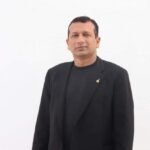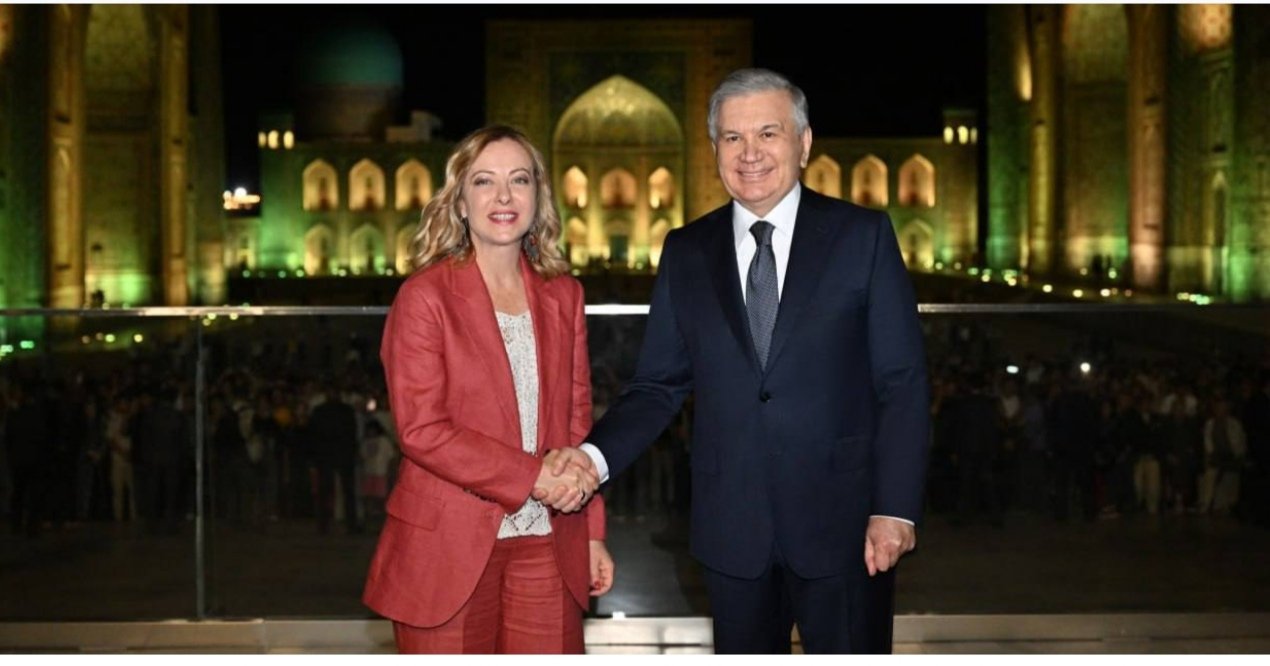Tashkent (TDI): Prime Minister of Italy, Giorgia Meloni, has arrived in Samarkand as her first stop on a three day Central Asia visit. From here, she heads to Astana where all five Central Asian Head of States will join her for the Italy-Central Asia Summit, on Friday.
In Samarkand, the President of Uzbekistan, Shavkat Mirziyoyev, welcomed Meloni and took her to cultural monuments in the city. In the context of bilateral trade between Uzbekistan and Italy, which sharply fell by a 15.4% in early months of the ongoing year, the meeting between the two premiers aims to restore mutual trade.
Not just that, Meloni’s arrival in Samarkand is very strategic in nature as it is the first time since 1997 that an Italian Head of Government has come to Uzbekistan. This indicates a clear desire to expand relations with the country, well beyond the energy sector.
President Shavkat #Mirziyoyev and #Italy’s Prime Minister @GiorgiaMeloni visited the Registan architectural ensemble and the ethnographic park “Eternal City” in #Samarkand. pic.twitter.com/zqMmCPSb8H
— Shavkat Mirziyoyev’s Press-service (@president_uz) May 28, 2025
Contrary to the case with Uzbekistan, Italy is Kazakhstan’s third-largest trade partner, behind China and Russia, and bilateral trade volume surged 25% in 2024.
The shift in Italy’s interest in Central Asian countries is clear; it is looking to cooperate in defense, industrial trade, military hardware production, and diplomacy.
Unlike the United States, there is much less skepticism in Central Asia regarding the European countries, and having declared neutrality openly, CARs stand a good chance to forge stronger industrial ties with Italy.
The specific details of agreements remain unknown for now but as the Summit kickstarts tomorrow, more details will follow.
A Timeline of Italy-Uzbekistan Relations
This visit marks a significant milestone in the modern history of Uzbek–Italian relations, which began in March 1992.
Shortly after the establishment of diplomatic ties between the two countries, the Embassy of Italy opened in Tashkent, and in 1998 Uzbekistan inaugurated its diplomatic mission in Rome. Since 2021 and 2023, respectively, honorary consulates of Uzbekistan have been operating in Florence and Milan.
On June 8-9, 2023, President of Uzbekistan Shavkat Mirziyoyev paid an official visit to Italy. As a result of this visit, a Joint Declaration on establishing a strategic partnership was adopted. Subsequently, on November 9-11 of the same year, President of Italy Sergio Mattarella paid an official visit to Uzbekistan.
In December 2019 and September 2021, the Foreign Ministers of Uzbekistan and Italy exchanged visits, and in May 2024, they met again in Rome on the sidelines of the 3rd Ministerial Conference “Italy – Central Asia”.
Read More: President of Uzbekistan visiting Italy to Strengthen Uzbek-Italian Relations
It is noteworthy that Rome was the first among European capitals to initiate this ministerial-level dialogue with Central Asia back in 2019. Italy supports Uzbekistan’s efforts to accede to the World Trade Organization and to conclude an Enhanced Partnership and Cooperation Agreement with the European Union.
Ahead of the official visit of the President of Uzbekistan to Italy in June 2023, a Uzbekistan–Italy Business Forum was held in Rome, attended by more than 200 entrepreneurs and companies from both countries.
As a result of the forum, 38 investment agreements, 13 technological partnership agreements, and 13 export contracts were signed, with a total value of EUR 9.2 billion.
There are 55 enterprises operating in Uzbekistan with the participation of Italian investment, including 24 with 100% Italian capital. The establishment of regular direct flights between Tashkent, Milan, and Rome in March 2023 has also contributed to the expansion and strengthening of business cooperation.
Nuzhat Rana is the Managing Editor (website) at The Diplomatic Insight.

Sohail Majeed
Sohail Majeed is a Special Correspondent at The Diplomatic Insight. He has twelve plus years of experience in journalism & reporting. He covers International Affairs, Diplomacy, UN, Sports, Climate Change, Economy, Technology, and Health.




